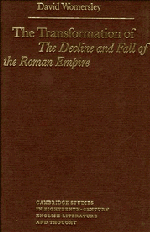Book contents
- Frontmatter
- Contents
- Acknowledgements
- A note on references and quotations
- Introduction
- PART I The historiography milieu
- PART II The Decline and Fall of the Roman Empire
- 3 Introduction
- Volume 1 - 1776
- 4 Style
- 5 Augustus
- 6 Tacitus
- 7 Narrative
- 8 Chapters XV and XVI
- Gibbon among the philosophers
- Volumes II and III - 1781
- Volumes IV, V and VI - 1788
- Appendix
- Bibliography
- Index
8 - Chapters XV and XVI
Published online by Cambridge University Press: 05 September 2013
- Frontmatter
- Contents
- Acknowledgements
- A note on references and quotations
- Introduction
- PART I The historiography milieu
- PART II The Decline and Fall of the Roman Empire
- 3 Introduction
- Volume 1 - 1776
- 4 Style
- 5 Augustus
- 6 Tacitus
- 7 Narrative
- 8 Chapters XV and XVI
- Gibbon among the philosophers
- Volumes II and III - 1781
- Volumes IV, V and VI - 1788
- Appendix
- Bibliography
- Index
Summary
Will you set up profane reason against sacred mystery? No punishment is great enough for your impiety. And the same fires, which were kindled for heretics, will serve also for the destruction of philosophers.
HumeWhenever I hear the current running against the Characters of my Friends I never think them in such Danger as when Candour undertakes their Defence.
SheridanVolume I of The Decline and Fall is set apart from the later instalments of the history because it is the only instalment which has a perceivable structure (by which I mean an ordonnance of parts calculated to create a sense of wholeness through the careful admission of variety or change). The first three chapters are general surveys, addressing themselves to the extent and military force, the union and internal prosperity, and the constitution of the empire in the age of the Antonines. There follow four chapters of narrative, in which the course of decline is deduced from Commodus to the secular games of Philip. Then come two interleaved chapters (Chapters VIII and IX) which review the state of both the Persian and German barbarians and thus constitute a pause in the flow of narrative (although not, as we have seen, in the development of Gibbon's implicit argument). They are succeeded by a further five chapters of narrative which take the history of the empire from the accession of Decius to Constantine's reunion of the empire after the divisions introduced by Diocletian.
- Type
- Chapter
- Information
- Publisher: Cambridge University PressPrint publication year: 1988

